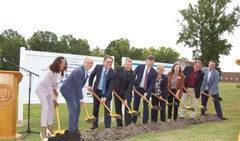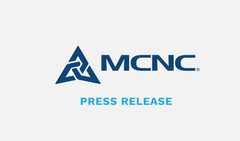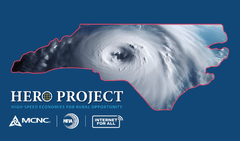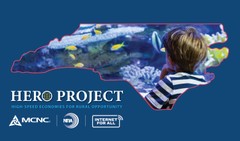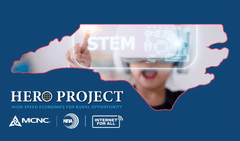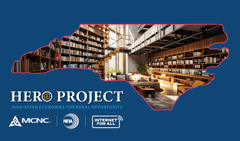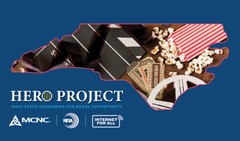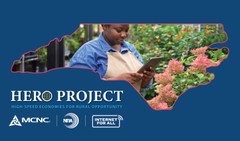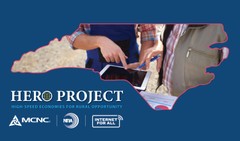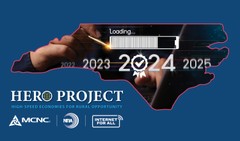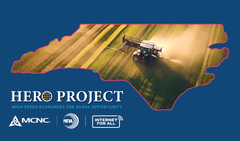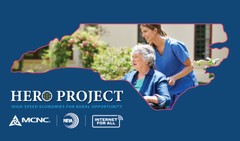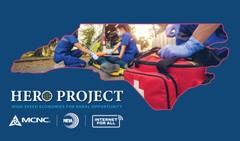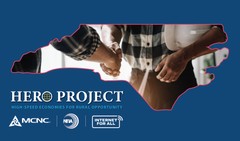HERO Project: Technology and internet is the catch of the day for North Carolina’s seafood industry

MCNC understands that access to high-speed internet can be the catalyst that lifts many communities out of poverty and puts access to health care, education and social services within the reach of all. Our HERO (High Speed Economies for Rural Opportunities) Project aims to ensure every community in North Carolina has what it needs to fully participate in today’s society.
The fishing industry has been important to the state’s economy, culture and environment for centuries. There are thousands of people catching, preparing, and selling millions of pounds of seafood every year. Just as many industries have evolved through the use and access of technology, fishing is no exception; today’s modern fishermen require high-tech resources as well as high-speed broadband for optimizing a catch and getting food to market in a timely manner.
Shape of Coastal NC
North Carolina has about 322 miles of coastal shoreline and the second largest estuarine system in the country. In total, the state has 12,331 miles of coastal shoreline, as outlined by NC SeaGrant. There are more than 70 wild marine species that North Carolina fishermen catch in coastal environments. Many of the businesses that support the fisheries and seafood processing are also located in the coastal regions of the state. Learn more from UNC-TV’s “Tracing the Coastline.”
On the coast, there are both wild-caught and mariculture producers. Harvesting occurs in the ocean, near the shore, and in sounds such as the Albemarle and Pamlico sounds. Many of the businesses that support the fisheries and seafood processing are also located in the coastal regions of the state.
Job. Revenue. Ecosystems.
The fishing industry in North Carolina has a been a way of life for generations, providing good jobs and livelihoods. But rising operational costs, the declining health of many fisheries, the changing face of coastal towns, lack of modern resources and connectivity, increased foreign competition and even climate change, has forced commercial fishing and the fishermen themselves to adapt to change.
Commercial fishing is a $150 billion global industry, according to the Environmental Defense Fund. Today, at least 10 percent of the world’s people make a living from seafood. Adding advanced technology makes management, and fishing itself, more efficient – fishermen boost profits, while protecting marine ecosystems.
And, North Carolina has some of finest seafood in the world!
North Carolina’s commercial seafood industry’s economic impact is nearly $300 million and supports more than 5,500 jobs, based on numbers from Always NC Fresh. From the boat and dock to the trucks and markets, commercial fishermen create jobs – including many in rural coastal areas that have few other means of employment. While the largest impacts occur in the harvesting sector along the coast, according to a reportfrom NC State University’s Department of Agricultural and Resource Economics, the industry also includes seafood preparation and wholesaling, retail, and restaurants.
21st Century Seafood Operations
Commercial fishing also sustains jobs and income for businesses such as marinas, boatyards, boat builders, fishing gear and fuel suppliers. Seafood landings support processing, packing, warehousing and transportation jobs. The seafood supply chain results in thousands of jobs for wholesalers, distributors, retail seafood markets, farmers markets, grocery stores, and restaurants.
Aquaculture, or fish farming, also has grown in economic importance. The National Fisheries Institute reported that farmed fish production has increased at a nationwide average rate of 10.7 percent a year since 1984. By the early 2000s there were approximately 250 individuals in North Carolina licensed for pond and tank aquaculture, with sales totaling more than $19 million. Trout was the most profitable species, followed by hybrid striped bass, catfish, and softshell crab.
Recreational boating in North Carolina also has a significant economic impact, reporting a $9.1 billion annual revenue stream, according to the National Marine Manufacturers Association. There are approximately 384,000 registered boats in North Carolina supporting over 28,000 jobs and more than 1,000 business. According to state regulators, recreational fishermen in 2021 (the most recent year currently available) took nearly 18 million fishing trips in state waters, contributing almost 40,000 jobs and generating close to $1.7 billion in income and $4.2 billion in sales.
High-Tech Fishing Transformation
High-tech is transforming fishing, with benefits reaching consumers and the environment. Broadband internet access is essential for commercial fishing operations for several reasons.
- Safety: Weather updates, real-time sea conditions, and emergency communication can all be facilitated by a broadband connection.
- Efficiency: Communication with shore for catch reporting, price negotiation, and fleet management can be streamlined.
- Fishery Management: Electronic catch reporting, electronic logbooks, and access to fisheries databases can all be facilitated by a broadband connection.
High-tech advancements also are revolutionizing fishing practices and the seafood supply chain.
Tech in Fishing
- Precision Fishing: Sonar technology helps locate fish schools, while underwater cameras allow species identification, minimizing bycatch or untargeted fish.
- Fishery Monitoring: Electronic monitoring systems with cameras and sensors ensure regulations are followed and data is collected for sustainable fishing practices.
Tech in Supply Chain
- Traceability: QR codes and electronic tagging track fish from catch to consumption, ensuring quality and reducing fraud. Consumers can see the origin and journey of their seafood.
- Logistics Optimization: Real-time data on weather, catch location, and market prices helps optimize delivery routes and pricing strategies, reducing waste and increasing efficiency.
The value of the seafood and boating industries in North Carolina cannot be understated or underestimated. The value of high-speed internet and access to 21st century technologies in these areas for these industries also cannot be overlooked. MCNC’s network currently sits at 4,536 miles serving all 100 counties in North Carolina. The MCNC HERO Project will increase the network by another 209 miles, filling in some areas that unfortunately remain unserved.
Investing in broadband infrastructure is an investment in the future, and this project is part of a long-term endeavor to unlock the full potential of everyone in North Carolina.
Construction for is expected to begin this summer with completion planned for June 2025.
